How we learned English in a Japanese school in the Philippines
Hello! In the winter of this year, we spent a month in the Philippines learning English.

(Latisha teacher sends greetings to habrakhabra readers)

(all the diversity of the Russian-language part of the school at that time: from left to right Alex (a school employee and part-time student), students Zhenya, Zhenya and Roma)
')
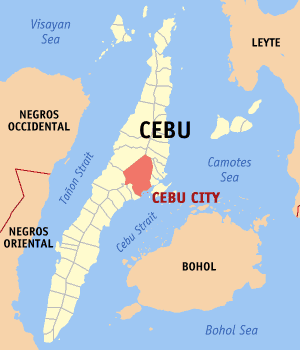 The idea of learning English abroad came to us a long time ago: after all, in an environment where no one speaks your native language, progress should go much faster.
The idea of learning English abroad came to us a long time ago: after all, in an environment where no one speaks your native language, progress should go much faster.
For me, the criterion was a small time difference with Europe / Moscow, since I planned to combine work with study, and both of us wanted the country where we were going to have English to be either an official language or common enough to communicate not only at school, but also on the street.
Of course, the price also played a role, since, unfortunately, we are not billionaires.
After some searches, we narrowed down the list to the following:
Another fact in favor of the Philippines was our acquaintance with the Filipinos on a diving safari a year ago. In English, the Filipinos spoke the best on the boat, and in general we liked the people.
Looking ahead, I will say that a set of individual classes in the Philippines costs as much as group classes in Malta.
We immediately google two potential options:
At first we tried to get to Boracay, but Eric (the teacher) was busy all month, so we began to learn more about the school in Cebu.
At about the same time, I came across Alex's post on the Vinsky forum, in which he said that he was invited to work at this school as a curator of Russian-speaking students. Probably, communication with him and led to the fact that we finished the search.
About the Philippines, we knew by that time only that it was an island nation, had long been a colony of Spain and spent considerable time under the occupation of Japan, and then the United States. By that time in Asia, we visited 10 countries, and I was sure that after the Cambodian Poipet I could survive everywhere, so there is nothing to fear. But first things first.

There are no direct flights to Cebu and even Manila from Moscow. It seems that there are flights to Manila from the Far East, but I did not specify.
The budget options to get to Cebu we found two:
When choosing, we were guided not even by the price, but by the fact that 6 o'clock is not a good time to dock: you don’t have time to look in the city, and it’s too long to sit at the airport.
With the Hong Kong route, there is much more freedom: you can spend as much time in HK as you need. And yes, I think this is the best city on earth.
When we booked a hotel in Hong Kong, I was unpleasantly surprised by the prices - everything was either without seats or 3 times more expensive than on our last visit. As a result, we found a room in a hostel with a double bed and a private bathroom for 3,500 rubles per day.
And only on the day of arrival, I realized that we arrived in the Chinese New Year. On the one hand - everything is expensive and a lot of people on the streets, on the other - we saw a great fireworks display. (Photos of salute on the phone for obvious reasons are not obtained).
The main program of the school is 6 individual lessons, 2 group and evening electives on weekdays with weekends on Saturday and Sunday. I asked me to cut the program, because I intended to go to work right after graduation.
As a result, I got 6 individual lessons every day, Zhenya - 6 individual and two group lessons. The cost for 4 weeks of study is 39,000 and 43,000 PHP, respectively (30 and 33 thousand rubles). The price does not include food and accommodation. Since I wanted to work in silence, we chose not a student hostel, but hotels. As I recall, living in a hostel increased the price by 20%, and comprehensive meals at school cost 2000 PHP (1500 rubles) per week.
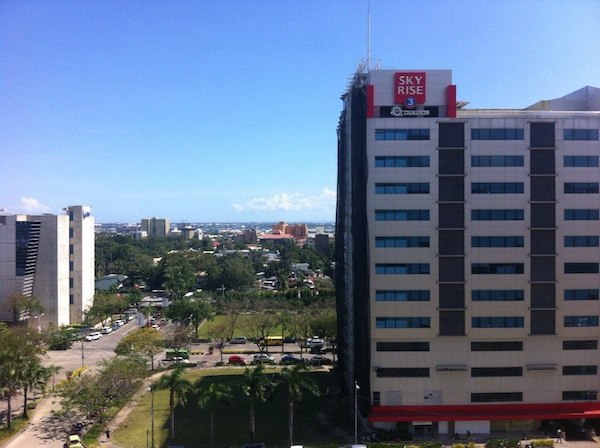
Since I planned to work immediately after graduation, we chose the hotel taking into account the proximity to IT-park (the area where the school is located); the presence of a good wifi was also a significant criterion.
In total, during our life in Cebu, we changed 3 hotels in the city itself, plus we got out somewhere every weekend, but more on that later.
Prices for hotels in the city start from 600 rubles per night (hereinafter the price of a double room), a good hotel will cost 1500-3000 rubles. On the coast (Mactan City district) prices are simply exorbitant - it's easy to find a hotel and for 15,000 per day. It is worth saying that the quality of housing is much worse than the average for Southeast Asia. If in Thailand we rented a room for 600 rubles and there was hot water, cleanliness, Wi-fi and maybe even air conditioning, then everything is much worse. In general, the concept of cleanliness from the locals differs from the generally accepted one.
Rubbish with long black hair on the floor is the “standard” of service in any hotel.
In general, hotel accommodation was our mistake, we had to live in a dorma - it would be cheaper, and conditions would be better. Yes, and cheerful company would always be at hand.
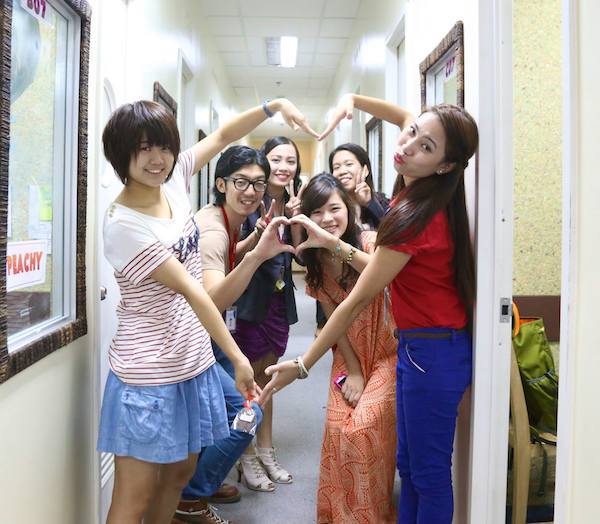
80 percent of students are Japanese, and of very different ages. Both teenagers and retirees come across, although the majority are still 18 to 30 years old. In second place - the Koreans. The remaining percentages are divided between the Chinese and Taiwanese. In trace amounts there are Thais, Russians, Arabs.
When we entered the school, there were only four Russians, including Alex, who is not exactly a student. Judging by the activity in social networks, now there are about 10 of them Russians. This is no longer 4, but still very little, and this is beneficial in learning a language.
Before school I knew about the Japanese ... nothing. It turned out that these are people from another planet. IMHO between Russians and Chinese is much more common than between Chinese and Japanese. In a nutshell, the feeling does not describe. Probably the main thing is total politeness, a completely different look at some things and a little childish naivete. The mentality was especially felt by my wife, who attended group classes. My opinion is based solely on communication during the change.
By the way, I can not help but notice that Japanese girls look very well groomed or something. For example - try to determine the age of girls from the photo below (I will leave the correct answer in the comments).

The school's management is also Japanese, so I can only say about the processes that everything is at the highest level. From the unusual - in the school toilets there is no toilet paper. According to the management, this was done on purpose so that Japanese students would not relax and always have paper / napkins with them - this may be useful to them in public places.
The school is located in the newest quarter of Cebu - It-park, which is very different from the rest of the city. If you do not go beyond the fence, you can get the deceptive feeling that you are in Europe or the United States. The offices of large It-companies are located nearby, whose main activity is call-centers: almost all Filipinos speak good English, and very little money is asked for their work. :) Immediately - a bunch of international cafes with a kitchen for every taste, banks, currency exchangers and so on.

(photo from google)

Philippines - a country of bureaucrats. As an example - in this picture three tickets are a ticket for a ferry to Boracay from the airport, a ticket for using the terminal and a receipt for payment of the environmental fee. To get to the island you need to buy these tickets at three different ticket offices, and then you will check these tickets for three different people. And so in everything.
With regard to education, you can stay in the country for up to 30 days with a Russian passport without a visa, but if you study, then you definitely need an SSP - special study permit. This is a special piece of paper that extends the right to be in the country (read - a study visa) and at the same time is something like a license for the school. As a rule, SSP will be already included in the tuition fee. If ordered separately, then taking into account any notaries, the price will be about 6500 php (5000 rubles).

Also, all students are given an id-card, see photo. This card is a pass to the building, and a passport for local ones. When checking into a hotel, for example, they ask for an id-card, and not a passport.
In general, with passports, everything is difficult - not everyone has them. In the elections, local voters vote by fingerprint, and the id is used as an internal document. You can even fly on local airlines.
We arrived in the city on Sunday evening. On the first day after checking into the hotel, Alex managed to give us a tour of the school, boast a free pool and gym, in the evening we drank a beer in the Q-cafe, which by the way also belongs to the Japanese. The first time I drank beer with ice, seizing his kimchi. By the way, kimchi with beer is quite edible.
The next day we had an entrance test. Carry it out on TOEIC questionnaires, only in an abbreviated version.
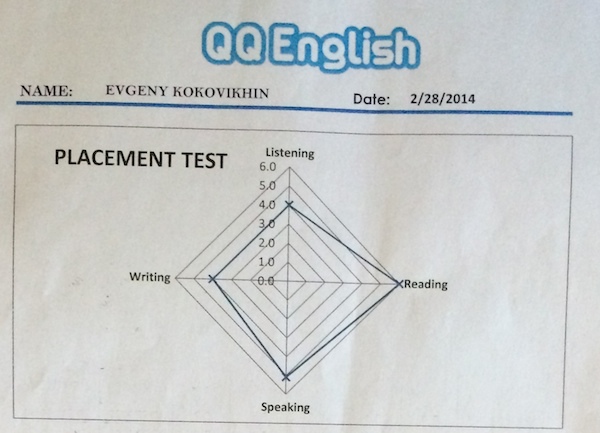
During my life I have studied English several times: first at school, then at the university, then at some courses, at others, etc. All this ended with a level upper intermediat. When I passed the entrance test, my level was high beginer, which is three steps lower than I had in Russia. To say that I was surprised - to say nothing. Well, okay, I just accepted the fact that the Russian system of assessing the level of the English language is different from the global one. Although I probably knew it before, just feeling it the hard way is a little offensive.
The Japanese, by the way, have to do even worse: they have a different writing system, another phonetics, grammar. Some came to school without even knowing the alphabet, by the way, and many left without significant progress.
The test took a very long time, so on the first day we were no longer taught. In the evening there was an acquaintance, cakes and various activites. This was not much different from the acquaintance in the pioneer camp, that's just all in English and the people around are mostly Asian. By the way, towards the end of the first week, I finally got used to the type and perceived all the students and teachers as “my own”.

In the evening, issued a schedule. My classes began at eight in the morning and lasted up to three days with an hour break for lunch. The class itself lasts 50 minutes, after which 10 minutes is given for a break. It seemed to me more comfortable than the usual school timetable: nothing needs to be counted: if the hour has changed, then it's time for a lesson.
I had 6 classes. I will not list the names, because it is not interesting, I can only say that at each emphasis was placed on the spoken language. Yes, one lesson was devoted to reading and one lesson - listening, but most of the time, you either have to listen to the teacher or speak.
All teachers are local, but you shouldn’t be afraid of this: unlike most other Asian countries, they don’t have an obvious accent. Rather there, but he does not look like an Indian, for example. A couple of times I even asked to reproduce “Filipino Inglish” in order to understand exactly how the accent sounds and how not to pick it up. The main thing that I noticed is a partial replacement of the sound “f” by “p”, that is, they can pronounce “pilipino” instead of “filipino”.
About teachers separately, I note that I did not like everything, but this is more personal than professional. If the teacher does not like it at all, then the school gives the right to change it, but not more than once a week. I did not use this right, so I will not tell the details.
The classic lesson is structured as follows:
Zhenya had two more group classes, then I write them down from her words.
Group classes are not as useful as individual ones: after all, the group is different in level, plus the Japanese have a very strong accent. As a result, more energy is spent on understanding the Japanese than on learning a language. There were a couple of cool stories, for example:
Or:
Teachers of the topic of Europe and Russia are very interesting, therefore, at every convenient occasion, they try to ask any question or draw a parallel with local traditions. Sometimes it comes out funny:
For example, once in class I showed pictures of Yakuts as evidence that Russia is big and not all “Russians” look like me or my wife. By the way, about my wife: four times we had a dialogue like this:
Another interesting fact: Asians (not only Filipinos) do not eat rabbits. When I replied that we sometimes cook a rabbit at home, the reaction was as if we were eating human babies.
The main plus of studying, and indeed living in the “environment” - the active vocabulary is growing very fast and the language barrier is breaking down. Even if you do not understand, you do not strive, but pick up synonyms or explain something on your fingers.
A classic example is that in the Philippines all drinks are served with ice, so if you want ordinary black tea, then you should definitely call it hot tea, otherwise you will get some kind of lipton from a bottle where there will be more ice than a drink. So, the word hot, we stubbornly did not understand. IMHO the whole thing in a strong blow to on, which must be pronounced completely wrong. But after all, Russian schools do not teach phonetics. :(
The exit was found almost at the end of the trip. Since we didn’t learn how to pronounce hot correctly, we acted according to the following algorithm:

To close the topic of education, I will say that in a month we have grown to the level of intermediat, that is, we have risen by two steps. This is considered a great progress, apparently due to the fact that the Japanese language is given much more difficult. Of the minuses - immersion on Wednesday was not as complete as if we lived in a hostel. Well, in terms of subjective sensations, the level of the language has grown substantially.
In general, I had the following idea: from eight to three days I study with a lunch break, then from three days until midnight I work with one hour break for rest. Something like this turned out, though sometimes without a break, sometimes I was cut down a little earlier, and sometimes I had to linger. To say that I was tired is to say nothing. Perhaps this is the experience that I do not want to repeat. All the same, it is very difficult to maintain such a pace for a month.
// I am talking about combining work and study: it is very difficult to be active from 6 am to midnight every day for a month.
I make a living by programming, so it was not so difficult for me to agree on remote work.
Regarding the process - before the end of Zhenya's classes, I worked directly from school: there are normal public places with soft pillows and a library in its territory, where it is always quiet. Then we went to the hotel, where I continued. Internet everywhere of acceptable quality: about 1-2Mbs down and 0.5-1 up. What upset is giant pings: to America about 250-300 ms, to Russia - 500-1000. It is unpleasant, but tolerable.
I did not use the mobile Internet because Wi-Fi was everywhere.
No resources are blocked on the Internet, Facebook is loaded, torrents are downloaded.
We never travel without insurance, but somehow we didn’t pay much attention to the quality of the insurance company, and indeed, before the Philippines, we had never sought medical help abroad. In the Philippines - had to. I will not go into details, I will only say that AlfaStrakhovanie and its international operator cannot provide the proper level of service: all their assistance has come down to the public hospital address and the promise to reimburse expenses in Russia if we pay cash on the spot. I don’t want to be in a public hospital in Cebu for the second time: take a Soviet clinic, mix mud and tropical diseases into it - voila, the hospital is ready.
Fortunately, by that time we already had many acquaintances among the locals, and they advised a good paid hospital. According to them, he was terribly expensive, in fact, the primary reception cost us 600 rubles. At the same time the staff was qualified and friendly. An interesting difference from clinics in Russia - in Cebu, each doctor has his own personal secretary, his own card file, etc. In fact - every doctor is self-sufficient.
From tropical species, only dengue can be picked up here, and even then it should be very “lucky”. Malaria is officially almost everywhere (on the island of Cebu - definitely not). But to bring some contamination of “dirty hands” is easier than ever: confirmation - yes, read it on the same Vinsky forum.
In general, in large cities is very dirty. In this case, antiseptic gels are not particularly common. In principle, if you wash your hands often and do not eat on the street, then nothing terrible should happen.
Under the word “dirty” - I mean it is dirty. In Bangkok, I could sit on the curb, eat chicken kebab or pad thai, bought on the street and drink his whiskey and cola cooked right there, without crossing the inner threshold of disgust. In Cebu it was much dirtier.
For my taste the local food is not very. But this is for my taste and I do not impose it.
This is the second country in my life in which I could not eat local cuisine. The locals do not eat fruit at all (although they live in the tropics) and seafood (although here it is, the ocean, next door). All meat is usually imported freeze. Favorite cooking method - deep fryer, in which the oil has never changed. From meat they prefer pork. One of the national dishes - pork fat, deep fried. Another national dish is balut. I will not apply the picture, google yourself.
By the way, local people have a positive correlation between income level and weight. If you are rich, you will be at least well-fed, and if your family is rich in several generations, you will grow to a normal height.
With food, we were saved by a large shopping center located nearby, in which there were international cafes and a good supermarket. Here we noticed the connection between income level and weight: mostly plump Filipinos came into the European supermarket.
We ate European, Thai, Japanese cuisine, but we tried to stay away from Filipino.
Of interest: in McDonalds and KFC, almost all dishes are served with rice and the chicken is cooked much stronger. Prices are significantly lower than in Moscow.
In It-park is also full of international cuisine, that is, it is difficult to stay hungry here. No problem, you can find dishes familiar to us: pizza, soups, sushi, salads.
There are donuts with a divine taste.
Below I will list a few facts about the Philippines and Filipinos.
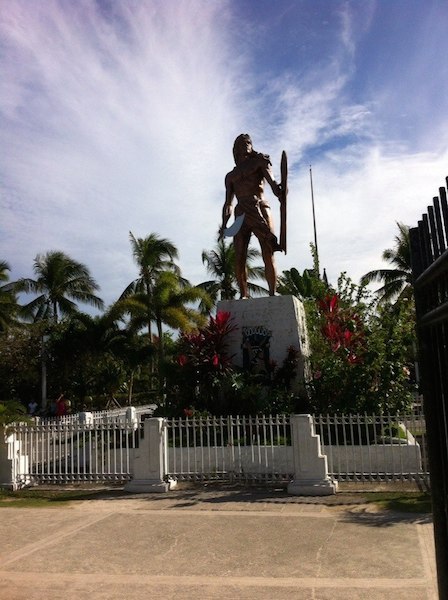
Filipinos are Catholics. Catholicism is practically the state religion. For example, divorces are prohibited in the country, since This is not a godly business. Abortion (in my opinion, too, is prohibited) and they consider protection as murder, therefore the average age of motherhood is very low. We met women who became mothers at 13. Magellan, who opened the Philippines to Europeans, is a national hero, because it was he who brought Christianity to the islands. Lapu-Lapu - Magellan's killer (in the photo :) is also considered a hero, because He initiated the liberation movement.
Despite the previous point, there are a lot of open gays on the islands. Among the teachers, too, there are several people.
I do not know how to continue this paragraph. Their presence did not cause me any inconvenience.
Probably, this item applies only to large cities. 90% of the city is a slum. Even in a prosperous It-park, in the morning you can meet children sleeping in boxes right at the offices. Closer to nine, they disappear somewhere, but reappear the next morning. According to teachers, children are actively selling drugs, because according to local laws, up to a certain age, they are not generally liable for criminal liability.
Most likely this applies only to megacities like Cebu and Manila - after all, big cities attract different people.
Taxi drivers during landing block all doors in order to avoid theft. Taxi, by the way, goes over the counter and is very cheap. Landing - 40 pesos (30 rubles), then every 300 meters - 10 pesos. The whole city can be driven for 300 php (250 rubles)
You can read the story of appearance on the Internet, and I will just attach a picture. They are funny.
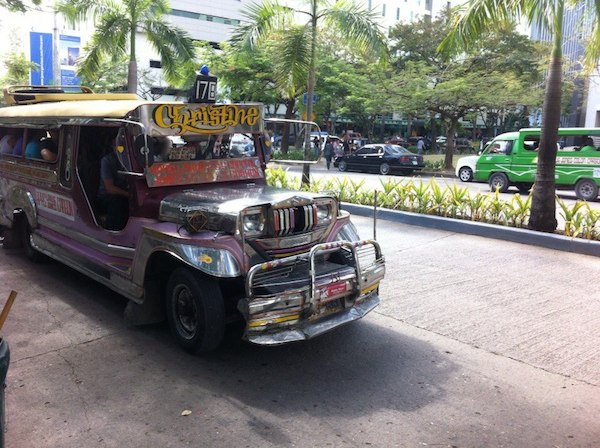
In the city, you can walk on foot only in It-park and Ayala shopping center. In general, this is the city of the winning car (preferably with air conditioning and a good air filtration system).
There are no sidewalks either.
This pleasantly surprised us. Intercity buses are very decent. Conditionally can be divided into two categories: with air conditioning and without it. The fare is about the same. Air-conditioned buses are really cold. Filipinos like other residents of warm countries like to make it as cold as possible. Old buses open windows, so it’s not hot either.
In the city it is better to travel by taxi, it is very cheap, but it is also possible for a jeepney, there is a penny in general there: 8 pesos (5 rubles), if I'm not mistaken.
Not all the time to sit in a dusty city. During the life in the Philippines, we had three days off. Since the description of the rest is somewhat beyond the format of habrakhabr, I will simply list the events and attach pictures:
Overall, it was a very interesting experience. I can say with confidence that, firstly, I liked everything, and secondly (most importantly in training), the level of English has significantly increased. I regret a little that we did not live in a hostel, in this case the immersion on Wednesday would be more complete. Well, the international collective is very cool. I now have friends in social networks have Japanese, Chinese and Arabs.
ps.I thought for a long time to lay out an article or not: after all, it does not quite correspond to the subject of Habr, but when I read a similar article about studying in South Africa, I understood what to write. It turns out the topic of education abroad is very popular.
pps. QQ English pays me nothing for this article, I don’t set myself the goal of advertising them, I just share my experience. If you are interested, Alex has a Russian-speaking group in one well-known social network, it is very easy.
ppps I forgot to write conclusions.

(Latisha teacher sends greetings to habrakhabra readers)

(all the diversity of the Russian-language part of the school at that time: from left to right Alex (a school employee and part-time student), students Zhenya, Zhenya and Roma)
')
Why the Philippines?
 The idea of learning English abroad came to us a long time ago: after all, in an environment where no one speaks your native language, progress should go much faster.
The idea of learning English abroad came to us a long time ago: after all, in an environment where no one speaks your native language, progress should go much faster.For me, the criterion was a small time difference with Europe / Moscow, since I planned to combine work with study, and both of us wanted the country where we were going to have English to be either an official language or common enough to communicate not only at school, but also on the street.
Of course, the price also played a role, since, unfortunately, we are not billionaires.
After some searches, we narrowed down the list to the following:
- Australia - dropped immediately because of the price of the flight and accommodation and training.
- England - first of all, no longer because of the weather. We planned the training for February, so it was also a way to escape from the cold.
- Malta is in principle normal, not far, but we thought it would be boring there - still a small island, from which one cannot get away.
- Philippines - mild climate, sea, ocean, where you can swim and very cheap. Well, an important fact - the currency of the Philippines has the abbreviation PHP.
Another fact in favor of the Philippines was our acquaintance with the Filipinos on a diving safari a year ago. In English, the Filipinos spoke the best on the boat, and in general we liked the people.
Looking ahead, I will say that a set of individual classes in the Philippines costs as much as group classes in Malta.
School selection
We immediately google two potential options:
- to learn from an expat from England one-on-one on Boracay
- big enough QQ English school in Cebu
At first we tried to get to Boracay, but Eric (the teacher) was busy all month, so we began to learn more about the school in Cebu.
At about the same time, I came across Alex's post on the Vinsky forum, in which he said that he was invited to work at this school as a curator of Russian-speaking students. Probably, communication with him and led to the fact that we finished the search.
About the Philippines, we knew by that time only that it was an island nation, had long been a colony of Spain and spent considerable time under the occupation of Japan, and then the United States. By that time in Asia, we visited 10 countries, and I was sure that after the Cambodian Poipet I could survive everywhere, so there is nothing to fear. But first things first.
How to get there

There are no direct flights to Cebu and even Manila from Moscow. It seems that there are flights to Manila from the Far East, but I did not specify.
The budget options to get to Cebu we found two:
- Korean airlines - round-trip ticket with a 6-hour guaranteed docking in Seoul cost at that time about 45,000 rubles per person (I’ll indicate all prices in rubles if you need to convert them to another currency, here’s the converter: https: // www.google.com/?gws_rd=ssl#q=1000+rub+in+usd )
- Direct flight to Hong Kong, from there - a low-cost airline. We chose this option: Aeroflot and Cathay Pacific carry to HK. Tickets for both are from 16 to 20 thousand round-trip, depending on the season and the time of booking. From Hong Kong to Cebu flies low-cost Cebu Pacific. For two tickets with 1 piece of baggage, we gave 4500HKD, which resulted in about 20 thousand rubles (for two).
When choosing, we were guided not even by the price, but by the fact that 6 o'clock is not a good time to dock: you don’t have time to look in the city, and it’s too long to sit at the airport.
With the Hong Kong route, there is much more freedom: you can spend as much time in HK as you need. And yes, I think this is the best city on earth.
When we booked a hotel in Hong Kong, I was unpleasantly surprised by the prices - everything was either without seats or 3 times more expensive than on our last visit. As a result, we found a room in a hostel with a double bed and a private bathroom for 3,500 rubles per day.
And only on the day of arrival, I realized that we arrived in the Chinese New Year. On the one hand - everything is expensive and a lot of people on the streets, on the other - we saw a great fireworks display. (Photos of salute on the phone for obvious reasons are not obtained).
Cost of
The main program of the school is 6 individual lessons, 2 group and evening electives on weekdays with weekends on Saturday and Sunday. I asked me to cut the program, because I intended to go to work right after graduation.
As a result, I got 6 individual lessons every day, Zhenya - 6 individual and two group lessons. The cost for 4 weeks of study is 39,000 and 43,000 PHP, respectively (30 and 33 thousand rubles). The price does not include food and accommodation. Since I wanted to work in silence, we chose not a student hostel, but hotels. As I recall, living in a hostel increased the price by 20%, and comprehensive meals at school cost 2000 PHP (1500 rubles) per week.
Accommodation

Since I planned to work immediately after graduation, we chose the hotel taking into account the proximity to IT-park (the area where the school is located); the presence of a good wifi was also a significant criterion.
In total, during our life in Cebu, we changed 3 hotels in the city itself, plus we got out somewhere every weekend, but more on that later.
Prices for hotels in the city start from 600 rubles per night (hereinafter the price of a double room), a good hotel will cost 1500-3000 rubles. On the coast (Mactan City district) prices are simply exorbitant - it's easy to find a hotel and for 15,000 per day. It is worth saying that the quality of housing is much worse than the average for Southeast Asia. If in Thailand we rented a room for 600 rubles and there was hot water, cleanliness, Wi-fi and maybe even air conditioning, then everything is much worse. In general, the concept of cleanliness from the locals differs from the generally accepted one.
Rubbish with long black hair on the floor is the “standard” of service in any hotel.
In general, hotel accommodation was our mistake, we had to live in a dorma - it would be cheaper, and conditions would be better. Yes, and cheerful company would always be at hand.
About school

80 percent of students are Japanese, and of very different ages. Both teenagers and retirees come across, although the majority are still 18 to 30 years old. In second place - the Koreans. The remaining percentages are divided between the Chinese and Taiwanese. In trace amounts there are Thais, Russians, Arabs.
When we entered the school, there were only four Russians, including Alex, who is not exactly a student. Judging by the activity in social networks, now there are about 10 of them Russians. This is no longer 4, but still very little, and this is beneficial in learning a language.
Before school I knew about the Japanese ... nothing. It turned out that these are people from another planet. IMHO between Russians and Chinese is much more common than between Chinese and Japanese. In a nutshell, the feeling does not describe. Probably the main thing is total politeness, a completely different look at some things and a little childish naivete. The mentality was especially felt by my wife, who attended group classes. My opinion is based solely on communication during the change.
By the way, I can not help but notice that Japanese girls look very well groomed or something. For example - try to determine the age of girls from the photo below (I will leave the correct answer in the comments).

The school's management is also Japanese, so I can only say about the processes that everything is at the highest level. From the unusual - in the school toilets there is no toilet paper. According to the management, this was done on purpose so that Japanese students would not relax and always have paper / napkins with them - this may be useful to them in public places.
The school is located in the newest quarter of Cebu - It-park, which is very different from the rest of the city. If you do not go beyond the fence, you can get the deceptive feeling that you are in Europe or the United States. The offices of large It-companies are located nearby, whose main activity is call-centers: almost all Filipinos speak good English, and very little money is asked for their work. :) Immediately - a bunch of international cafes with a kitchen for every taste, banks, currency exchangers and so on.

(photo from google)
Bureaucracy

Philippines - a country of bureaucrats. As an example - in this picture three tickets are a ticket for a ferry to Boracay from the airport, a ticket for using the terminal and a receipt for payment of the environmental fee. To get to the island you need to buy these tickets at three different ticket offices, and then you will check these tickets for three different people. And so in everything.
With regard to education, you can stay in the country for up to 30 days with a Russian passport without a visa, but if you study, then you definitely need an SSP - special study permit. This is a special piece of paper that extends the right to be in the country (read - a study visa) and at the same time is something like a license for the school. As a rule, SSP will be already included in the tuition fee. If ordered separately, then taking into account any notaries, the price will be about 6500 php (5000 rubles).

Also, all students are given an id-card, see photo. This card is a pass to the building, and a passport for local ones. When checking into a hotel, for example, they ask for an id-card, and not a passport.
In general, with passports, everything is difficult - not everyone has them. In the elections, local voters vote by fingerprint, and the id is used as an internal document. You can even fly on local airlines.
Studying proccess
We arrived in the city on Sunday evening. On the first day after checking into the hotel, Alex managed to give us a tour of the school, boast a free pool and gym, in the evening we drank a beer in the Q-cafe, which by the way also belongs to the Japanese. The first time I drank beer with ice, seizing his kimchi. By the way, kimchi with beer is quite edible.
The next day we had an entrance test. Carry it out on TOEIC questionnaires, only in an abbreviated version.

During my life I have studied English several times: first at school, then at the university, then at some courses, at others, etc. All this ended with a level upper intermediat. When I passed the entrance test, my level was high beginer, which is three steps lower than I had in Russia. To say that I was surprised - to say nothing. Well, okay, I just accepted the fact that the Russian system of assessing the level of the English language is different from the global one. Although I probably knew it before, just feeling it the hard way is a little offensive.
The Japanese, by the way, have to do even worse: they have a different writing system, another phonetics, grammar. Some came to school without even knowing the alphabet, by the way, and many left without significant progress.
The test took a very long time, so on the first day we were no longer taught. In the evening there was an acquaintance, cakes and various activites. This was not much different from the acquaintance in the pioneer camp, that's just all in English and the people around are mostly Asian. By the way, towards the end of the first week, I finally got used to the type and perceived all the students and teachers as “my own”.

In the evening, issued a schedule. My classes began at eight in the morning and lasted up to three days with an hour break for lunch. The class itself lasts 50 minutes, after which 10 minutes is given for a break. It seemed to me more comfortable than the usual school timetable: nothing needs to be counted: if the hour has changed, then it's time for a lesson.
I had 6 classes. I will not list the names, because it is not interesting, I can only say that at each emphasis was placed on the spoken language. Yes, one lesson was devoted to reading and one lesson - listening, but most of the time, you either have to listen to the teacher or speak.
All teachers are local, but you shouldn’t be afraid of this: unlike most other Asian countries, they don’t have an obvious accent. Rather there, but he does not look like an Indian, for example. A couple of times I even asked to reproduce “Filipino Inglish” in order to understand exactly how the accent sounds and how not to pick it up. The main thing that I noticed is a partial replacement of the sound “f” by “p”, that is, they can pronounce “pilipino” instead of “filipino”.
About teachers separately, I note that I did not like everything, but this is more personal than professional. If the teacher does not like it at all, then the school gives the right to change it, but not more than once a week. I did not use this right, so I will not tell the details.
The classic lesson is structured as follows:
- Hi, Rio!
- Hi, Eugene! How are you?
... chatter about 10 minutes
... chatter on the topic of the lesson: listening to audio recordings of carriers, parsing texts, completing assignments, that's all
... chatter about the cultural features of Russia for 5-10 minutes
- Bye, Rio! Have a nice day!
- Bye, my friend! Have a nice day too!
Zhenya had two more group classes, then I write them down from her words.
Group classes are not as useful as individual ones: after all, the group is different in level, plus the Japanese have a very strong accent. As a result, more energy is spent on understanding the Japanese than on learning a language. There were a couple of cool stories, for example:
- Is it true that you have totalitarianism like in North Korea?
- o_0?
- Do not be afraid, no one is watching us, here you can tell the truth!
Or:
- We sort garbage into nine species, put it in different containers by day of the week, then it is taken out and processed. And what do you do with garbage?
- We throw it all together, then it is taken to special polygons. Apparently, there it is stored forever.
- o_0?
Teachers of the topic of Europe and Russia are very interesting, therefore, at every convenient occasion, they try to ask any question or draw a parallel with local traditions. Sometimes it comes out funny:
For example, once in class I showed pictures of Yakuts as evidence that Russia is big and not all “Russians” look like me or my wife. By the way, about my wife: four times we had a dialogue like this:
- Can I ask you a personal question?
- Of course
- You have the same name and surname, are you married?
- Yes!
- And what, according to Russian traditions, the wife takes not only the name of her husband, but also the name? We only have a surname!
... 5-minute explanation that coincidences sometimes occur, and in Russia, and indeed in the world, there are several names that can be given at birth to both men and women.
Another interesting fact: Asians (not only Filipinos) do not eat rabbits. When I replied that we sometimes cook a rabbit at home, the reaction was as if we were eating human babies.
The main plus of studying, and indeed living in the “environment” - the active vocabulary is growing very fast and the language barrier is breaking down. Even if you do not understand, you do not strive, but pick up synonyms or explain something on your fingers.
A classic example is that in the Philippines all drinks are served with ice, so if you want ordinary black tea, then you should definitely call it hot tea, otherwise you will get some kind of lipton from a bottle where there will be more ice than a drink. So, the word hot, we stubbornly did not understand. IMHO the whole thing in a strong blow to on, which must be pronounced completely wrong. But after all, Russian schools do not teach phonetics. :(
The exit was found almost at the end of the trip. Since we didn’t learn how to pronounce hot correctly, we acted according to the following algorithm:
- Would you like to drink something?
- Two cups of hot tea, please.
- Pardon?
- Hot tea. “Eich-ou-ti” tea plz. // Here you have to gesticulate, trying to draw the word hot

To close the topic of education, I will say that in a month we have grown to the level of intermediat, that is, we have risen by two steps. This is considered a great progress, apparently due to the fact that the Japanese language is given much more difficult. Of the minuses - immersion on Wednesday was not as complete as if we lived in a hostel. Well, in terms of subjective sensations, the level of the language has grown substantially.
Job
In general, I had the following idea: from eight to three days I study with a lunch break, then from three days until midnight I work with one hour break for rest. Something like this turned out, though sometimes without a break, sometimes I was cut down a little earlier, and sometimes I had to linger. To say that I was tired is to say nothing. Perhaps this is the experience that I do not want to repeat. All the same, it is very difficult to maintain such a pace for a month.
// I am talking about combining work and study: it is very difficult to be active from 6 am to midnight every day for a month.
I make a living by programming, so it was not so difficult for me to agree on remote work.
Regarding the process - before the end of Zhenya's classes, I worked directly from school: there are normal public places with soft pillows and a library in its territory, where it is always quiet. Then we went to the hotel, where I continued. Internet everywhere of acceptable quality: about 1-2Mbs down and 0.5-1 up. What upset is giant pings: to America about 250-300 ms, to Russia - 500-1000. It is unpleasant, but tolerable.
I did not use the mobile Internet because Wi-Fi was everywhere.
No resources are blocked on the Internet, Facebook is loaded, torrents are downloaded.
The medicine
We never travel without insurance, but somehow we didn’t pay much attention to the quality of the insurance company, and indeed, before the Philippines, we had never sought medical help abroad. In the Philippines - had to. I will not go into details, I will only say that AlfaStrakhovanie and its international operator cannot provide the proper level of service: all their assistance has come down to the public hospital address and the promise to reimburse expenses in Russia if we pay cash on the spot. I don’t want to be in a public hospital in Cebu for the second time: take a Soviet clinic, mix mud and tropical diseases into it - voila, the hospital is ready.
Fortunately, by that time we already had many acquaintances among the locals, and they advised a good paid hospital. According to them, he was terribly expensive, in fact, the primary reception cost us 600 rubles. At the same time the staff was qualified and friendly. An interesting difference from clinics in Russia - in Cebu, each doctor has his own personal secretary, his own card file, etc. In fact - every doctor is self-sufficient.
From tropical species, only dengue can be picked up here, and even then it should be very “lucky”. Malaria is officially almost everywhere (on the island of Cebu - definitely not). But to bring some contamination of “dirty hands” is easier than ever: confirmation - yes, read it on the same Vinsky forum.
In general, in large cities is very dirty. In this case, antiseptic gels are not particularly common. In principle, if you wash your hands often and do not eat on the street, then nothing terrible should happen.
Under the word “dirty” - I mean it is dirty. In Bangkok, I could sit on the curb, eat chicken kebab or pad thai, bought on the street and drink his whiskey and cola cooked right there, without crossing the inner threshold of disgust. In Cebu it was much dirtier.
Food
For my taste the local food is not very. But this is for my taste and I do not impose it.
This is the second country in my life in which I could not eat local cuisine. The locals do not eat fruit at all (although they live in the tropics) and seafood (although here it is, the ocean, next door). All meat is usually imported freeze. Favorite cooking method - deep fryer, in which the oil has never changed. From meat they prefer pork. One of the national dishes - pork fat, deep fried. Another national dish is balut. I will not apply the picture, google yourself.
By the way, local people have a positive correlation between income level and weight. If you are rich, you will be at least well-fed, and if your family is rich in several generations, you will grow to a normal height.
With food, we were saved by a large shopping center located nearby, in which there were international cafes and a good supermarket. Here we noticed the connection between income level and weight: mostly plump Filipinos came into the European supermarket.
We ate European, Thai, Japanese cuisine, but we tried to stay away from Filipino.
Of interest: in McDonalds and KFC, almost all dishes are served with rice and the chicken is cooked much stronger. Prices are significantly lower than in Moscow.
In It-park is also full of international cuisine, that is, it is difficult to stay hungry here. No problem, you can find dishes familiar to us: pizza, soups, sushi, salads.
There are donuts with a divine taste.
Local realities
Below I will list a few facts about the Philippines and Filipinos.
Total religiosity

Filipinos are Catholics. Catholicism is practically the state religion. For example, divorces are prohibited in the country, since This is not a godly business. Abortion (in my opinion, too, is prohibited) and they consider protection as murder, therefore the average age of motherhood is very low. We met women who became mothers at 13. Magellan, who opened the Philippines to Europeans, is a national hero, because it was he who brought Christianity to the islands. Lapu-Lapu - Magellan's killer (in the photo :) is also considered a hero, because He initiated the liberation movement.
Gay men
Despite the previous point, there are a lot of open gays on the islands. Among the teachers, too, there are several people.
I do not know how to continue this paragraph. Their presence did not cause me any inconvenience.
Poverty
Probably, this item applies only to large cities. 90% of the city is a slum. Even in a prosperous It-park, in the morning you can meet children sleeping in boxes right at the offices. Closer to nine, they disappear somewhere, but reappear the next morning. According to teachers, children are actively selling drugs, because according to local laws, up to a certain age, they are not generally liable for criminal liability.
Most likely this applies only to megacities like Cebu and Manila - after all, big cities attract different people.
Taxi drivers during landing block all doors in order to avoid theft. Taxi, by the way, goes over the counter and is very cheap. Landing - 40 pesos (30 rubles), then every 300 meters - 10 pesos. The whole city can be driven for 300 php (250 rubles)
Jeepney
You can read the story of appearance on the Internet, and I will just attach a picture. They are funny.

There are practically no public recreation areas in the city.
In the city, you can walk on foot only in It-park and Ayala shopping center. In general, this is the city of the winning car (preferably with air conditioning and a good air filtration system).
There are no sidewalks either.
Well developed public transport
This pleasantly surprised us. Intercity buses are very decent. Conditionally can be divided into two categories: with air conditioning and without it. The fare is about the same. Air-conditioned buses are really cold. Filipinos like other residents of warm countries like to make it as cold as possible. Old buses open windows, so it’s not hot either.
In the city it is better to travel by taxi, it is very cheap, but it is also possible for a jeepney, there is a penny in general there: 8 pesos (5 rubles), if I'm not mistaken.
Leisure
Not all the time to sit in a dusty city. During the life in the Philippines, we had three days off. Since the description of the rest is somewhat beyond the format of habrakhabr, I will simply list the events and attach pictures:
- Whale shark snorkeling. Yes, yes, Cousteau saw in his life 2 whale sharks, and I saw 4 of them in half an hour.
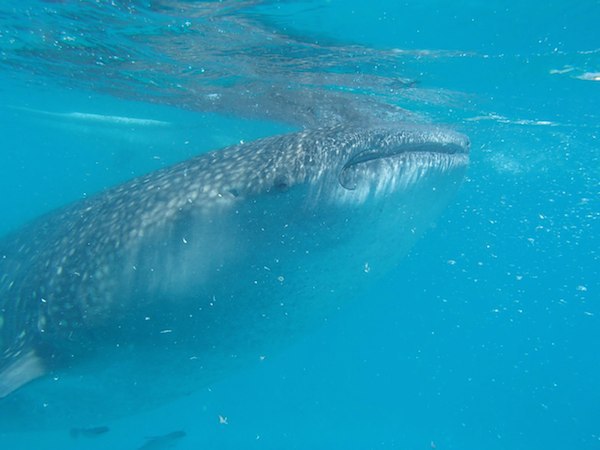
- Very beautiful waterfall in the jungle:

- Chocolate Hills:

- Tarsier (the smallest monkey in the world):
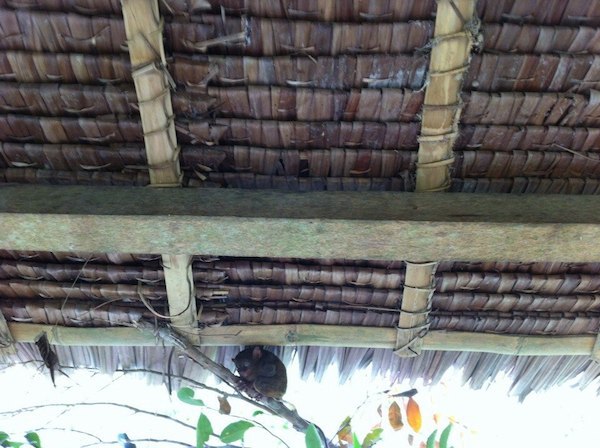
- Boracay (about which you can write a separate article):
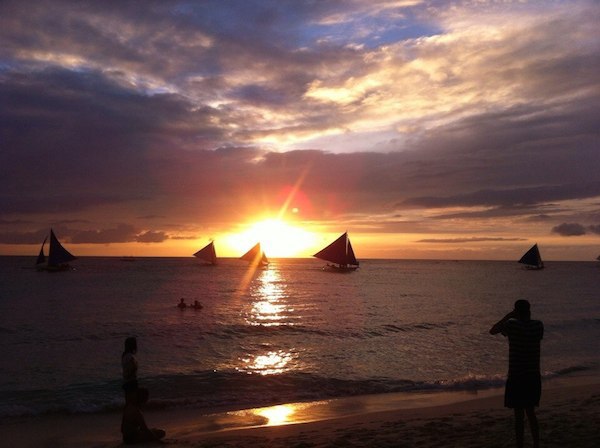
Overall, it was a very interesting experience. I can say with confidence that, firstly, I liked everything, and secondly (most importantly in training), the level of English has significantly increased. I regret a little that we did not live in a hostel, in this case the immersion on Wednesday would be more complete. Well, the international collective is very cool. I now have friends in social networks have Japanese, Chinese and Arabs.
ps.I thought for a long time to lay out an article or not: after all, it does not quite correspond to the subject of Habr, but when I read a similar article about studying in South Africa, I understood what to write. It turns out the topic of education abroad is very popular.
pps. QQ English pays me nothing for this article, I don’t set myself the goal of advertising them, I just share my experience. If you are interested, Alex has a Russian-speaking group in one well-known social network, it is very easy.
ppps I forgot to write conclusions.
- It is very cheap and convenient, there are no problems with visas, as in "alternative" countries
- The language level is growing very fast.
- The main feature of the school is one-on-one, so the problems “I am stronger than a group” are not here
- Combining work and study is not worth it, well, if you are not a robot
Source: https://habr.com/ru/post/229829/
All Articles